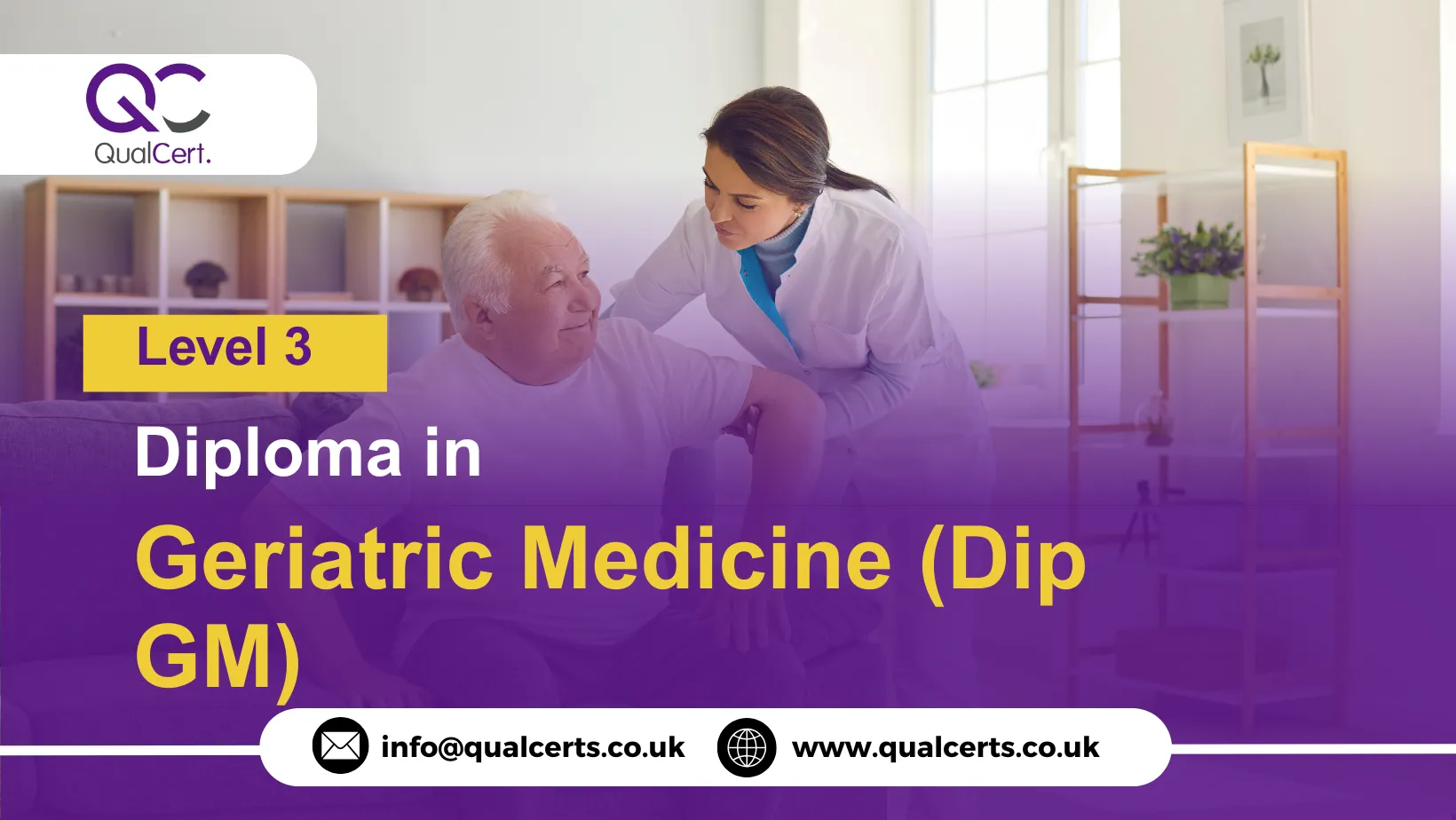The QualCert Level 3 Diploma in Geriatric Medicine (Dip GM) is a UK-accredited programme designed to provide learners with comprehensive knowledge and skills in the care of older adults. This qualification focuses on understanding age-related conditions, promoting holistic patient-centred care, and applying evidence-based practice to support healthy ageing.
Geriatric medicine is a vital field within healthcare, addressing the complex physical, psychological, and social needs of older patients. The diploma equips learners with the ability to work confidently in hospitals, community care settings, and long-term care facilities, ensuring high-quality care for the ageing population.
The QualCert Level 3 Diploma in Geriatric Medicine (Dip GM) provides a comprehensive foundation for understanding and supporting the healthcare needs of older adults. By combining theoretical knowledge with practical application, learners develop the confidence and expertise required to deliver patient-focused, ethical, and evidence-based care.
Course Contents of QualCert Level 3 Diploma in Geriatric Medicine (Dip GM):
The QualCert Level 3 Diploma in Geriatric Medicine (Dip GM), offers 60 Credits, requiring a Total Qualification Time (TQT) of 300 hours, including 210 Guided Learning Hours (GLH).
| Unit Ref# | Unit Title | Credit | GLH | TQT |
| QC27135-1 | Understanding Ageing and Geriatric Physiology | 10 | 35 | 50 |
| QC27135-2 | Assessment and Diagnosis in Older Adults | 10 | 35 | 50 |
| QC27135-3 | Management of Common Geriatric Conditions | 10 | 35 | 50 |
| QC27135-4 | Medication, Polypharmacy, and Therapeutic Interventions | 10 | 35 | 50 |
| QC27135-5 | Patient Safety, Risk Management, and Quality of Life | 10 | 35 | 50 |
| QC27135-6 | Evidence-Based Practice, Ethics, and Professional Development in Geriatric Medicine | 10 | 35 | 50 |
Entry Requirements for the QualCert Level 3 Diploma in Geriatric Medicine (Dip GM):
To enrol on the QualCert Level 3 Diploma in Geriatric Medicine (Dip GM), learners must meet the following entry requirements:
Minimum Age
Learners must be at least 16 years of age at the time of enrolment.
Educational Background
A minimum of a Level 2 qualification (or equivalent) is recommended. Learners without formal qualifications may be accepted based on relevant experience or prior learning.
Experience
No prior experience in geriatric medicine is required, although an interest in healthcare, medicine, or elderly care is encouraged.
Language Proficiency
Learners must demonstrate sufficient English language proficiency to fully engage with study materials, assessments, and discussions.
Learning Outcomes for the QualCert Level 3 Diploma in Geriatric Medicine (Dip GM)
Understanding Ageing and Geriatric Physiology
- Understand the biological, physiological, and psychological processes of ageing.
- Recognise normal versus pathological changes in older adults.
- Explain the impact of ageing on organ systems and overall health.
- Appreciate the social and environmental factors influencing elderly health and wellbeing.
Assessment and Diagnosis in Older Adults
- Apply assessment techniques for evaluating physical and cognitive function.
- Recognise early signs of common geriatric conditions, including dementia, frailty, and falls risk.
- Conduct holistic patient evaluations considering social, psychological, and medical factors.
- Interpret assessment findings to inform care planning and interventions.
Management of Common Geriatric Conditions
- Understand management strategies for conditions such as cardiovascular disease, osteoporosis, urinary incontinence, and chronic illness.
- Recognise the importance of multidisciplinary collaboration in care delivery.
- Apply person-centred approaches to support functional independence.
- Evaluate interventions to improve quality of life for older patients.
Medication, Polypharmacy, and Therapeutic Interventions
- Understand principles of pharmacology relevant to older adults.
- Recognise risks associated with polypharmacy and medication interactions.
- Apply safe medication management strategies in clinical settings.
- Explore non-pharmacological interventions to complement treatment plans.
Patient Safety, Risk Management, and Quality of Life
- Identify risks to patient safety in geriatric care environments.
- Apply risk assessment and management strategies to reduce harm.
- Promote quality of life and autonomy in older patients.
- Implement infection control, hygiene, and safe practice procedures.
Evidence-Based Practice, Ethics, and Professional Development in Geriatric Medicine
- Apply evidence-based principles to geriatric clinical decision-making.
- Understand ethical, legal, and professional responsibilities in elderly care.
- Develop reflective practice skills to enhance professional growth.
- Recognise the role of communication and cultural sensitivity in providing patient-centred care.
Aspiring Healthcare Professionals
Individuals seeking foundational knowledge in geriatric medicine to support a career in healthcare or medicine.
Healthcare Support Staff
Healthcare assistants, support workers, and allied health professionals aiming to enhance their understanding of elderly care.
Students Preparing for Higher Education
Learners preparing for further study in medicine, nursing, biomedical sciences, or related healthcare disciplines.
Community and Clinical Care Workers
Professionals working with older adults in hospitals, residential care, rehabilitation, or community health settings.
Personal and Professional Development
Individuals interested in improving their knowledge and skills in geriatric medicine, patient care, and age-related health management.
Qualified Tutors
- Tutors should hold a relevant academic qualification (Level 4 or higher) in medicine, nursing, or a related healthcare field.
- Tutors must have practical experience in elderly care and experience in teaching or supervising learners.
Learning Resources
- Centres must provide access to high-quality learning materials, including textbooks, journals, digital resources, and case studies.
- Learners should have opportunities to access current research and evidence-based practice guidelines in geriatric medicine.
Facilities and Support
- Centres must have suitable facilities for guided learning, workshops, and assessments.
- Online delivery must include a secure and interactive platform with reliable access for learners.
Assessment Standards
- Centres must adhere to QualCert’s quality assurance procedures.
- Assessments should be fair, consistent, transparent, and aligned with qualification standards.
Student Support
- Academic support should include guidance on coursework, practical assessments, and progression pathways.
- Pastoral support should be available to ensure learner wellbeing and engagement.
- Learners should receive advice on further education and career development opportunities in geriatric medicine.

